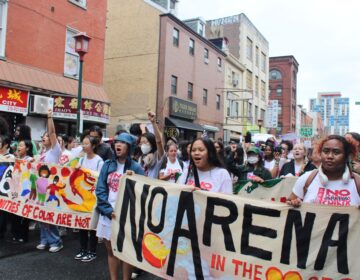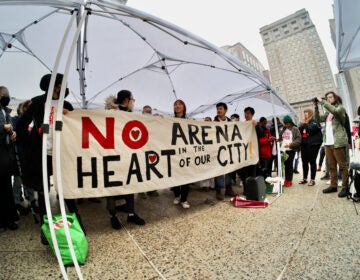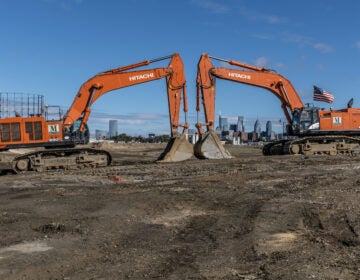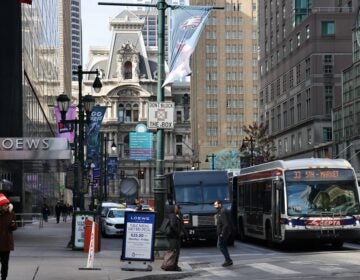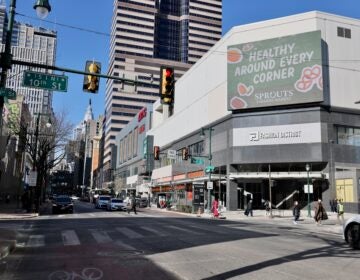Sources: Sixers abandon plan to build new Center City arena, will remain in South Philly
The decision is rooted in a deal struck with Comcast Spectacor, which hopes to transform the South Philly sports complex over the next decade.
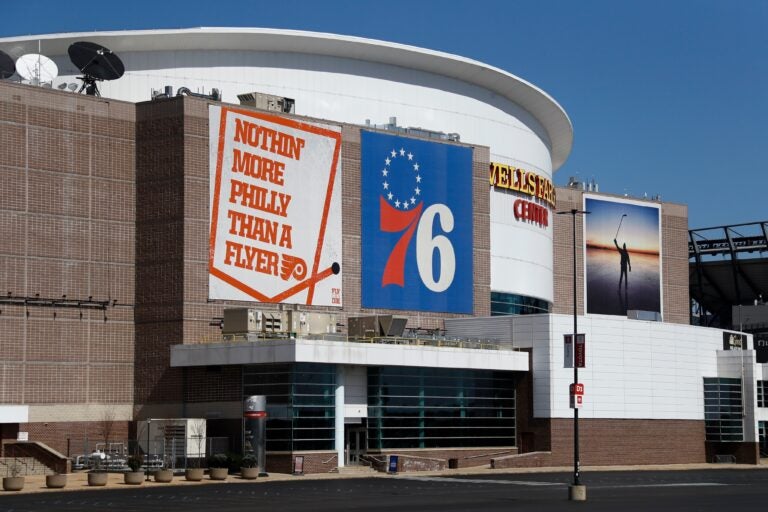
Wells Fargo Center, home of the Philadelphia Flyers NHL hockey team and the Philadelphia 76ers NBA basketball team, is shown March 14, 2020. (AP Photo/Matt Slocum, File)
What you need to know
- The 76ers proposed moving to a new $1.3 billion arena near Chinatown called “76 Place”
- The proposal drew swift condemnation, excitement, skepticism — and plenty of buzz
- Black Clergy of Philadelphia endorsed the project, while a majority of Chinatown businesses and other community members have voiced their opposition
- Philly City Council approved the project in December
In a stunning turn of events, the Philadelphia 76ers will remain at the sports complex in South Philadelphia instead of building a new basketball arena in Center City, according to multiple City Hall sources.
The decision is rooted in a deal struck with Comcast Spectacor, and comes more than two years after the team proposed the new arena. The NBA and the NFL helped broker the agreement, which ended the franchise’s second attempt to procure a home of its own.
Over the next decade, Comcast hopes to transform the sports complex into a year-round destination for work and play. The $2.5 billion proposal calls for new retail and restaurants, a music venue and a hotel.
When the master plan was announced in February, it did not specifically call for a new arena but did leave room for one. On Sunday, a labor leader said Comcast, which owns the Flyers and the Wells Fargo Center, had agreed to build a new “state-of-the-art” facility in the stadium district.
A Comcast spokesperson did not immediately respond to a request for comment.
Mayor Cherelle Parker, who strongly supported the arena project, is expected to hold a news conference at 11 a.m. Monday. Greenlighting the arena was a defining moment of her first year in office.
In December, City Council passed legislation authorizing the $1.3 billion arena. The 12-5 vote ended a contentious legislative process featuring hours of public testimony, intense closed-door negotiations and the forcible removal of several arena opponents from council chambers.
With the approvals in hand, the Sixers planned to build a privately funded arena atop SEPTA’s Jefferson Station at 10th and Market streets. The 18,500-seat facility would have replaced a third of the Fashion District mall.
The team argued the arena would help revitalize Market East, a disjointed stretch of retail, government buildings and tourist attractions that has struggled to thrive for decades despite millions in investment. The decision to remain in South Philly comes days after Macy’s announced it was closing 66 stores across the country, including the company’s iconic store at 13th and Market streets. A Sixers spokesperson did not immediately respond to a request for comment.
Local response
Council President Kenyatta Johnson broke the news to his colleagues Sunday morning. The message did not include any details beyond the Sixers’ decision to remain in South Philly.
Through a spokesperson, Johnson said he is referring all questions to the Parker administration. Johnson found out about the agreement Saturday.
For lawmakers who voted against the development, the about-face came as a relief.
“I always thought this project was half-baked and, to me, what’s happening now is just proof, not only that the project was not ready but also that the Sixers never had a commitment to us, to the citizens, to Council, to the city or anybody else. The commitment is to their bottom line,” Councilmember Jamie Gauthier said.
City Councilmembers Kendra Brooks and Nicolas O’Rourke, who voted against the arena, decried the news in a statement on Sunday, calling the team’s deal with the city “bad from the beginning.”
“Anybody following this issue closely could clearly see this was a power struggle between billionaires and corporations. Their plans can change on a whim, and these latest developments are a clear example of why the Mayor and City Council should never waste precious time and resources prioritizing billionaire projects over the work Philadelphians elect us to do. And who knows how much time we’ll have to waste now undoing what Council just did?” said Brooks and O’Rourke.
Residents and business owners in Chinatown strongly opposed the arena, calling it an existential threat to the 150-year-old neighborhood.
Over the last two years, the Save Chinatown Coalition, an umbrella group representing more than 245 organizations, urged the Sixers, Parker and lawmakers to stop the project. Activists argued it would choke the neighborhood with traffic on game days, hurting hundreds of small businesses in the process.
On Sunday, Asian Americans United, one of the coalition’s most vocal organizations, celebrated the Comcast agreement, declaring the team’s decision to stay in South Philly a victory of the “multiracial, multilingual, intergenerational movement.”
“The people of Philadelphia deserve a city that serves ALL communities. Our work continues and remains cautious to protect precious neighborhoods from exploitative development, but for now let’s celebrate together,” said the group in a statement posted online.
The city’s building trades, meanwhile, strongly supported building an arena in Center City. The project was slated to create hundreds of jobs. The unions also echoed sentiments that it would be a much-needed economic engine for Market East.
Mark Lynch, Jr., business manager for Local 98 of the International Brotherhood of Electrical Workers, applauded the Comcast deal on Sunday, calling it in a statement a “significant win for the 76ers, Comcast, our members and the entire City of Philadelphia.”
“The Stadium District in South Philadelphia will be dramatically enhanced and expanded, providing the 76ers with the new state-of-the-art arena the team needs and deserves. Comcast has also pledged to commit the financial resources needed to revive the dormant Market East corridor, which is critically important to the entire city,” Lynch said.
He said Comcast has pledged “financial resources” to help revive the Market East corridor.
The Sixers’ decision effectively ends speculation that the team might still be considering a move to New Jersey.
During its negotiations with the Parker administration and lawmakers, the team continued to entertain Gov. Phil Murphy’s proposal to build the arena along Camden’s waterfront. The state was prepared to award the Sixers up to $800 million in tax credits to incentivize the move.
The team is headquartered in New Jersey and its practice facility is located in Camden.
In 2020, the Sixers’ bid to build a new arena along the Delaware River in Philadelphia was upended by a competing proposal. The Delaware River Waterfront Corporation instead selected the Durst Organization to redevelop the parcels the team had wanted to use for the facility.

Get daily updates from WHYY News!
WHYY is your source for fact-based, in-depth journalism and information. As a nonprofit organization, we rely on financial support from readers like you. Please give today.






